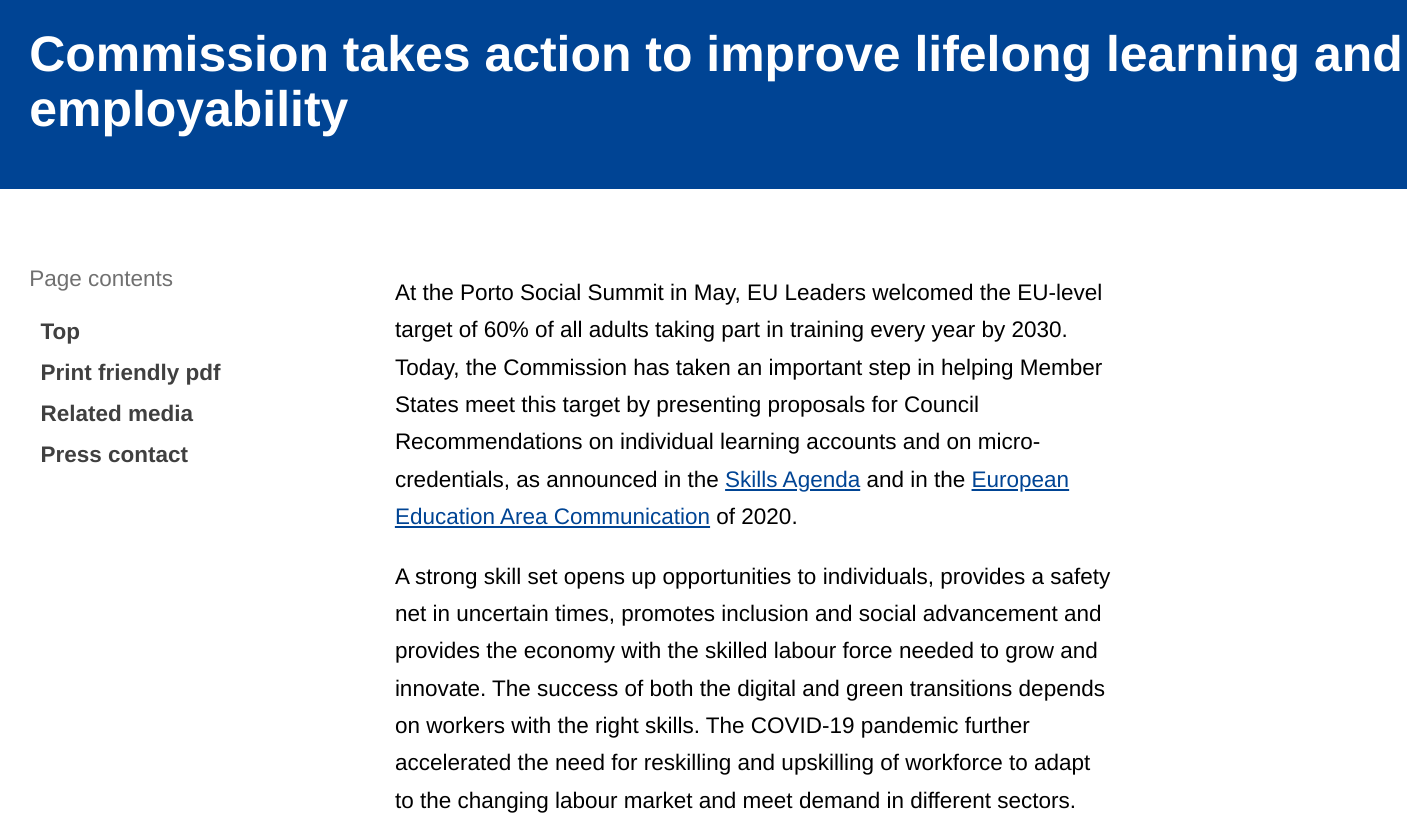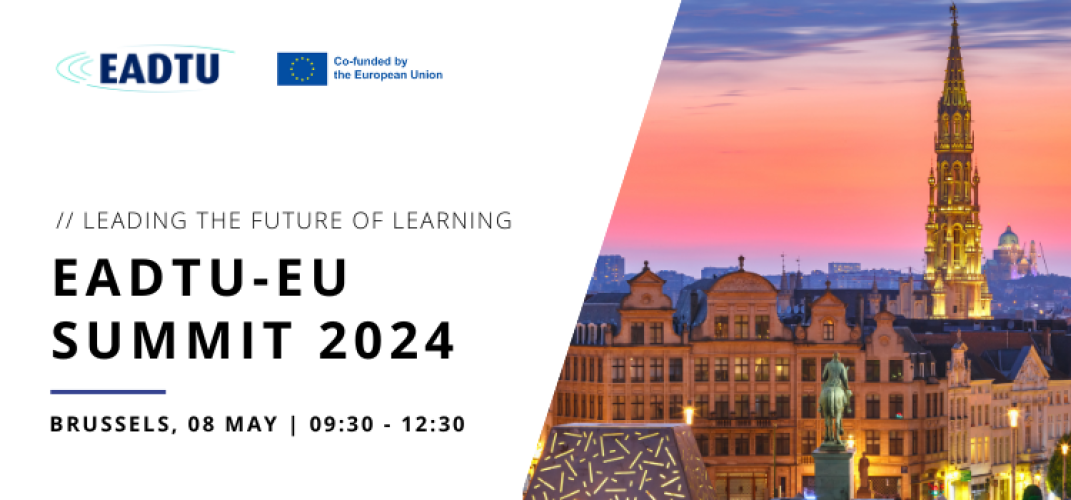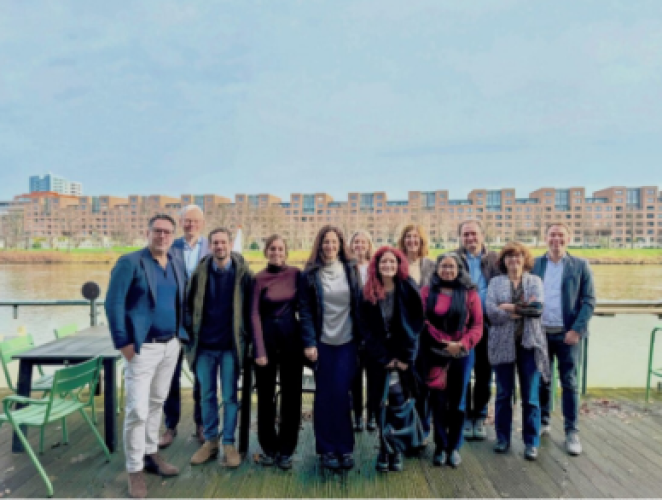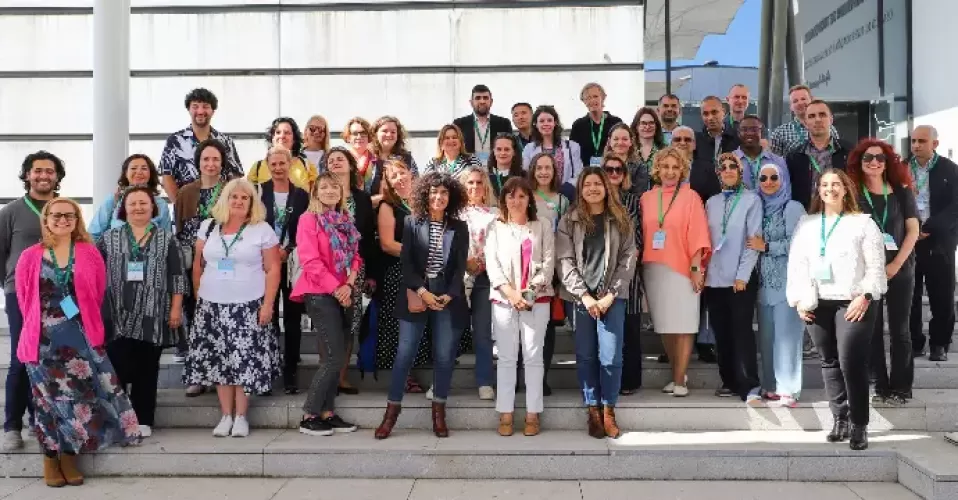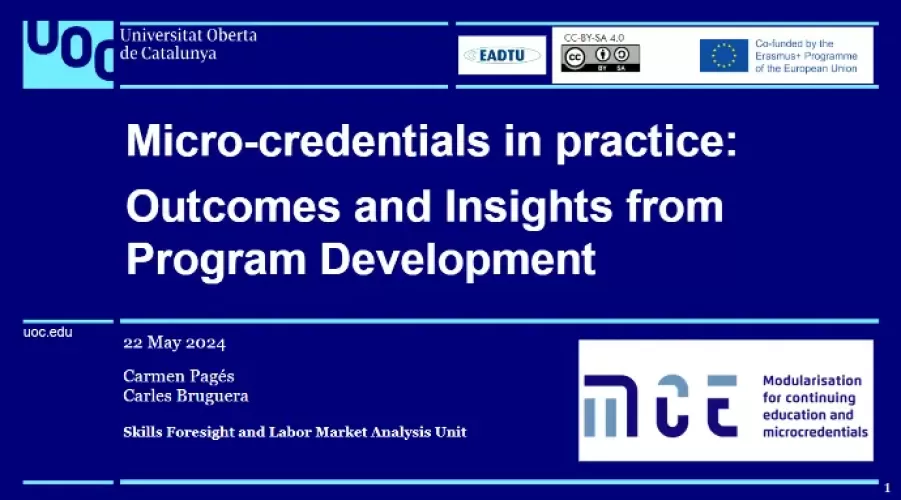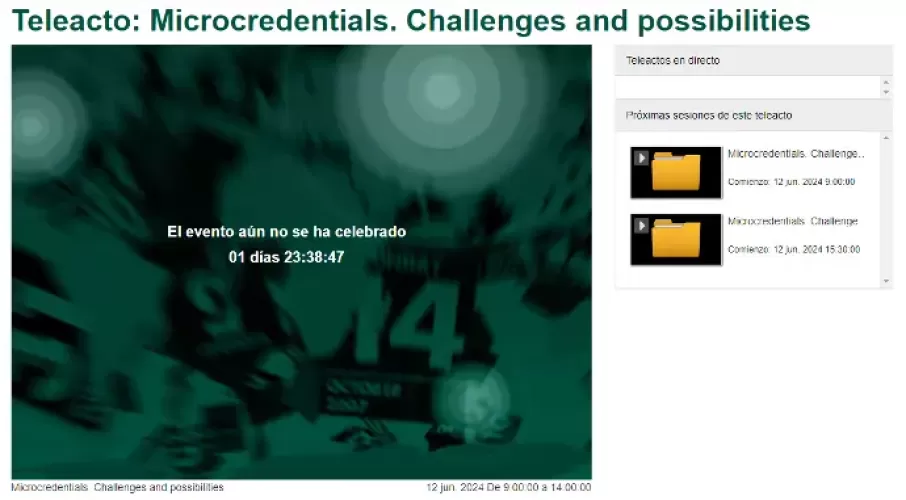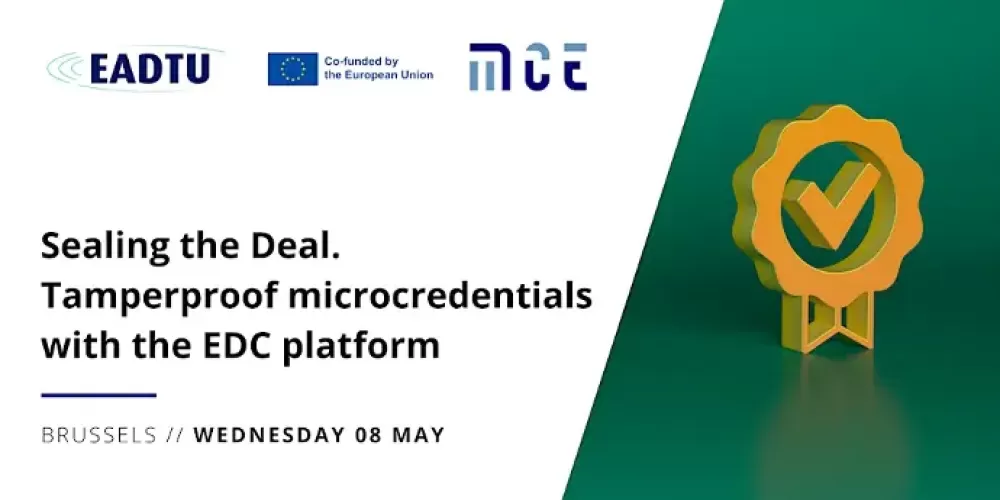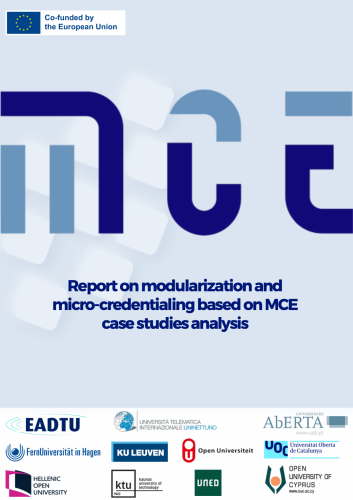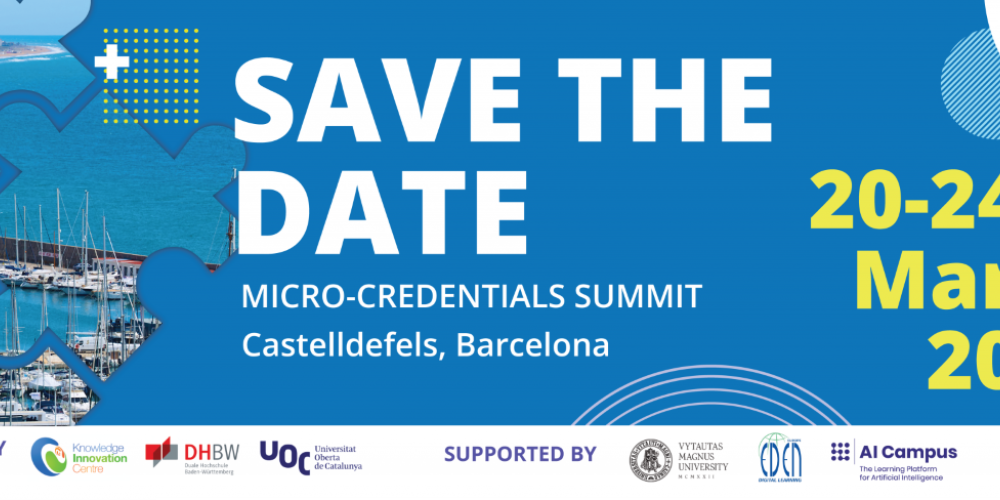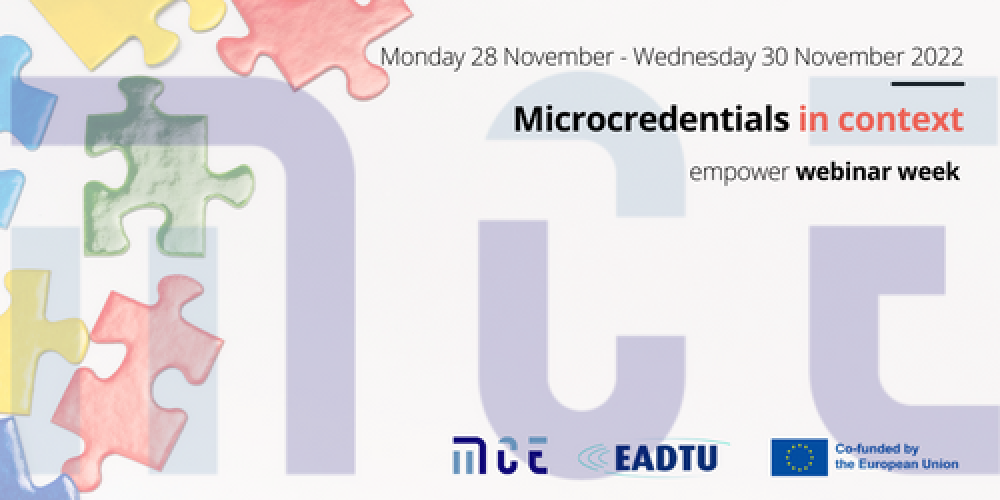News
Here you can find all the latest updates and news on the MCE project





News items
Expert Insights: Diogo Casa Nova to Present Findings on Micro-Credentials in European Distance Education
Diogo Casa Nova, PhD in Multimedia in Education from the University of Aveiro, will present key findings from the Modularisation of Continuing Education and Professionalisation by Micro-Credentials (MCE) project. This EU-funded initiative has explored national policies on micro-credentials (MC) across Europe, revealing significant gaps in adoption.
Casa Nova will discuss how, despite efforts in countries like Spain and Portugal, most European nations have yet to take decisive steps in aligning with the 2022 EU Council Recommendation on MC. With fragmented approaches and limited national frameworks, his presentation will shed light on potential challenges for the future of MC recognition in Europe, and how a lack of standardized policies may affect institutions and employers.
 New podcast episode with George Ubachs!
New podcast episode with George Ubachs!
EADTU-EU Summit + eSealing microcredentials
Registration is open for the EADTU-EU Summit, our annual networking event to discuss latest developments and new policy lines in higher education. The event takes place in Brussels on Wednesday 08 May 2024 and focuses on the themes personalisation, retention and student and staff mental wellbeing.
Directly following the Summit, EADTU organises an event on e-Sealing micro-credentials, through the lens of the European Digital Credentials platform.
Both on-site and online access tickets are available for the events.
Launch of the Microcredential Monitor
EADTU, in collaboration with the European MOOC Consortium (EMC) and teh MCE project, is thrilled to introduce the new Microcredential Monitor!
Our mission is to keep you informed about the evolving and dynamic landscape of microcredentials in the European regio. Our platform serves as an information hub where experts delve into developments, sharing experiences, practices, concepts, and institutional policy plans.
Read more here
MCE Consortium meet up in Maastricht
The MCE consortium is pleased to announce that the on-site partner meeting on the 20th and the 21st of February in Maastricht was a great success.
During the onsite meeting, various activities related to micro-credentials were discussed, including the organisation of institutional local seminars by partner universities. These seminars aim to facilitate the effective implementation and policy development of micro-credentials. Additionally, there were discussions on upcoming events and higher education insitutions' experimentation with micro-credential formats through pilots.
MCE-Project presented at "3rd IPCA's InWeek Are Micro-credentials reshaping Higher Education?"
Dr. Mirna Zeman participated at "3rd IPCA's InWeek – Are Micro credentials reshaping Higher Education?" at Polytechnic University of Cávado and Ave (IPCA) in Barcelos (Portugal) with a presentation on the MCE-project and its results. The presentation was part of Staff Week held between 21 and 24 of May 2024. The participants coming from over 30 universities from Europe and worldwide, including the members of the RUN-EU alliance, got insight in deliverables of the MCE-project and participated in discussions on microcredentials.
For more information about the presentation and event have a look at the following website.
UOC Hosts Two Empowering Internal Seminars Focused on Institutional Micro-Credential Development
The MCE project supports Higher Education Institutions in developing modular education and micro-credentials. As part of this initiative, the Universitat Oberta de Catalunya (UOC) hosted two internal online seminars to facilitate mutual learning on micro-credentials and their impact on higher education, featuring international experts and particular experiences from the University College Dublin and Dublin City University. The seminars, designed to aid the UOC micro-credentials development team, covered key topics such as the results of micro-credentials, which included understanding metrics like student enrollment, satisfaction, and feedback processes, along with insights from other universities; the design and evolution of micro-credential portfolios, which explored strategies for anticipating new educational needs and adjusting course offerings; and digital certification, which delved into experiences with various digital certification platforms. Conducted over two days, the first seminar was held on May 22, followed by the second on June 4.
UNED organises an informative workshop on the challenges and possibilities of micro-credentials
UNED as partner of the MCE Project will organise a face-to-face and online meeting in the Faculty of Education (UNED) at Madrid on June 12th, 2024, from 9:00 AM to 5:15 PM about Microcredentials, Challenges and Possibilities. The target audience are teachers, managers, managers and university students, companies, institutions, and organisations interested in continuing education. The dean of the Faculty of Education (UNED) will open the event at 9:00 A. M. and several experts from higher institutions linked to the MCE Project will analyse the real situation of micro-credentials from different points of view: ENQA's perspectives in Quality Assurance, the MCE Project, Challenges and possibilities, evidence-based recommendations on micro-credentials from national to EU level policies, and the formalization of continuing education. The registration is free, and a certificate is available
Find more information here
Sealing the Deal.
Tamperproof micro-credentials with the EDC platform
Tamperproof micro-credentials with the EDC platform
On Wednesday the 8th of May 2024, the MCE partnership explored how to unlock the potential of micro-credentials while ensuring their integrity and transparency. Colleagues joined an insightful event where they delved into the world of tamperproof micro-credentials through the lens of the European Digital Credentials platform.
Diogo Casa Nova, vice-rector for Innovation and Quality at the Universidade Aberta, opened the event with an introduction on micro-credentials and the MCE project. Followed by Koen Nomden, Team Leader for Transparency and Recognition of Skills and Qualifications, DG EMPL, European Commission) and Ildiko Mazar and Kia Likitalo, NNTT Data/European Digital Credentials for Learning) who spoke about the transparency, recognition and the role of eSealing, and the eSealed credentials with 'European Digital Credentials for Learning'. Kamakshi Rajagopal from EADTU spoke about EADTU's interest in eSealing and their upcoming pilots on this. The event was closed with and Q&A.
Find more information here
MCE Launches Seminar Series to Enhance Micro-Credential Policy and Implementation
MCE has initiated a series of institutional seminars aimed at facilitating the effective implementation and policy development of micro-credentials. The inaugural session was hosted by Kaunas Technology University (KTU) in December 2023. The next seminar is scheduled for February 16, 2024, at FernUniversität in Hagen (FernUni).
The KTU seminar concentrated on the latest European advancements in micro-credentials (MCs), while the upcoming session at FernUni will focus on the integration, recognition, and issuance of digital certificates for MCs.
These seminars are conducted in a blended format, offering both in-person and online participation. They are presented in two languages: the native language of the hosting institution and English, to accommodate a broader audience.
A highlight of the FernUni event will be a presentation by Ildiko Mazar from NTT DATA. Mazar will share insights on "Digitally-Signed Credentials: Verifying and Recognizing Skills with Europass Digital Credentials Infrastructure (EDCs)". For more information and updates, please refer to this brochure and follow us on social media using #MCE_microcredentials.
Analysing and mapping of current institutional qualifications for continuing edcuation and professional development and micro-credentials in the partnership
In a world that is rapidly changing, investing in lifelong learning and flexible learning pathways is swiftly becoming an issue of key importance. Increasing numbers of compact learning opportunities, nowadays called micro-credentials, are being developed across Europe and around the world.
The project partners seek to map and analyze existing institutional qualifications for continuing education and professional development (CEPD) and microcredentials in the partnership in relation to assumed learners’ aspirations and motivations. In the following report, we describe the partners’ institutional frameworks for nonstandard programs and analyze them against the backdrop of the most relevant definitions of micro-credentials. In the second step, we concentrate on learners’ motivations as assumed by the partners.
Report on modularization and micro-credentialing based on MCE case studeis analysis is out now
After a general introduction about Micro-credentials, document contextualization and scope, this document presents the case studies collection template developed for this report. This section introduces criteria used for defining the template, based on E-SLP project results and on the EC proposal for Council Recommendation on Micro-credentials. The section presents the final template elaborated for the collection of the case studies from partner universities within the consortium. Lastly, the results of the analysis of the data collected by 10 different Higher Education Institutions partner of MCE project (19 cases collected) are presented. The section highlights recurring characteristics of the short programs / micro-credentials / continuous professional development certificates provided by partner HEIs.
MCE goes international; contributing to the International Micro-credentials Summit in Barcelona!
From the 20th till the 24th of March MCE partners will join the International Micro-Credentials Summit in Castelldefels, Barcelona, Spain.
This summit is organised by the Knowledge Innovation Center, Duale Hochschule Baden-Württemberg, and the Universitat Oberta de Catalunya.
The Summit is an international gathering of thought leaders, practitioners, innovators, and policymakers working to improve the flexibility and responsiveness of educational systems. It will lay out a vision around the empowerment of individuals to create new learning and career pathways while at the same time unlocking the potential of our economies to transform to meet unprecedented social, economic, and environmental challenges. To know more stay tuned #MCE_microcredentials
Have a look here for the agenda, masterclass info, and summit themes.
Partners from the MCE project are contributing to the micro-credentials webinar week 28-30 November!
With the EU Council Recommendation on Micro-Credentials, the European Union has laid an important foundation for the future development of micro-credentials and thus for lifelong learning and professional development in Europe. The Recommendation seeks to support the development, implementation, and recognition of micro-credentials across institutions, businesses, sectors, and borders by setting common European standards.
From November 28th to November 30th, EADTU has organised the Empower webinar week in which MCE’s project partners are contributing by putting the European approach to micro-credentials in context. Specifically, there will be inputs from (1) Mareike Weiß (International Office, FernUniversität in Hagen) on the institutional policies on Micro-Credentials (results from WP3); (2) Diogo Casa Nova (vice- rector at Universidade Aberta, WP6 leader) on the adoption of the European approach to microcredentials in a Portuguese context; and (3) Carles Bruguera Trabal & Maria Carmen Page-Serra who will present the results of our meta-research study carried out within WP2 on the learners’ perspective on micro-credentials formats and learning services for continuing education.
The aim of the event is to share expertise and help European institutions in taking important steps towards high-quality, recognized micro-credentials. In each session, there will be time reserved for reflection and questions from the participants.
Register soon via this link: https://www.eventbrite.nl/e/microcredentials-in-context-webinar-week-tickets-463558545087
MCE partners meet in Athens for the first time
On Wednesday, the 19th of October 2022, the MCE partners got the opportunity to meet in person, for the first time, during the I-HE2022 conference, in Athens, Greece.
The partners came together to discuss the latest activities concerning the project, focusing on both ongoing activities and upcoming ones.
Particular attention was given to the upcoming focus group to be carried out within WP2, under the lead of UOC, and to the organization of the Pilots that will run next year under the lead of UNED and UNINETTUNO (WP5).
The consortium is ready to deliver the first project outcome: “D2.1 Meta-research on the learner perspective on micro-credential formats and learning services for continuing education and professional development”, and many others are approaching. Therefore, stay tuned and follow up on our progress #MCE_microcredentials.
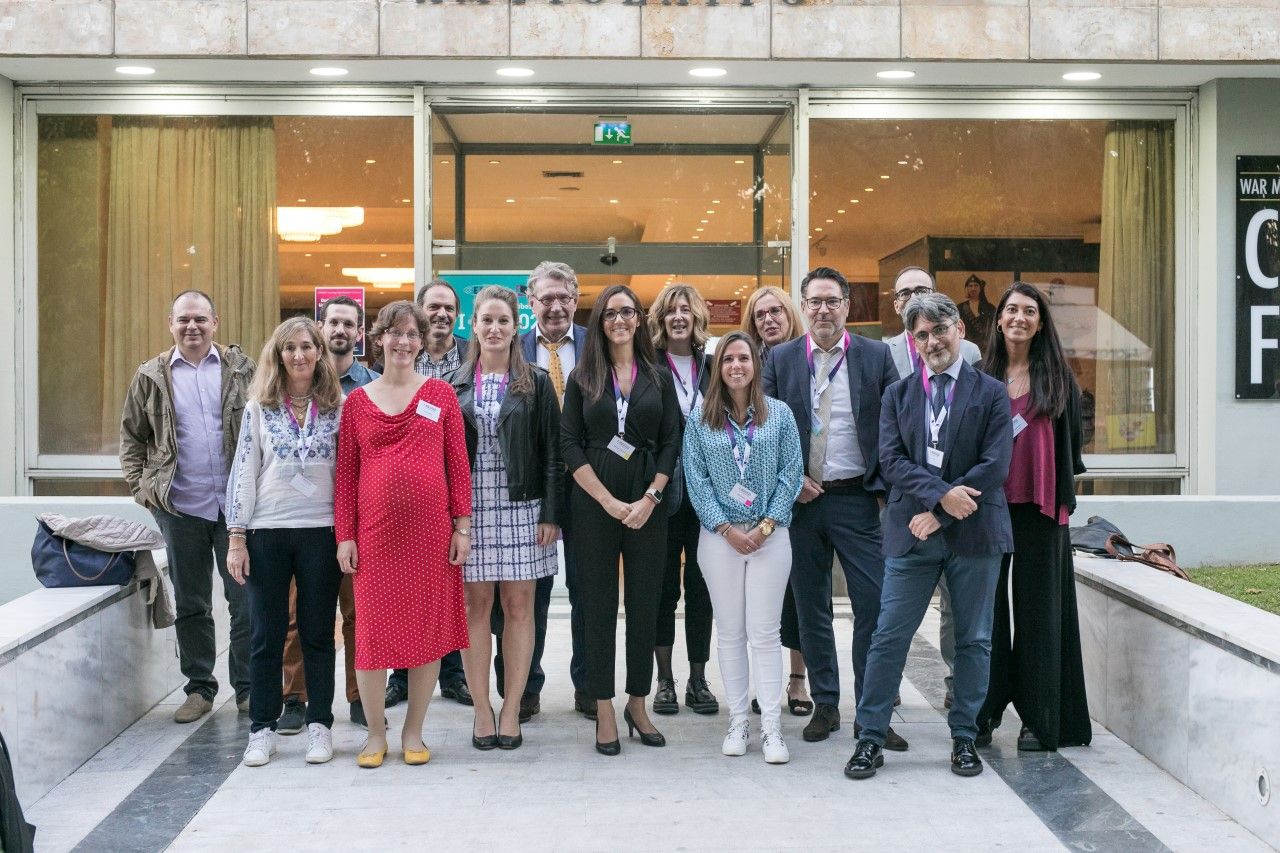
MCE: Modularisation of Continuing Education by Micro-credentials- Kick off on April 1st, 2022
Serious news on April Fool’s: MCE project takes off! 3years ErasmusPlus project coordinated by EADTU aimed at identifying the learners' perspective; developing HEIs strategy evidence for policies to develop framework and procedures for the modularisation of higher education.
MCE-stands for the Modularisation of Continuing Higher Education by Micro-credentials. It involves 10 partners and 3 associated for the next 3 years. The project aims to further conceptualize micro-credentials, adding also the learners' perspective on modularisation and micro-credentialing as a core dimension, so far underexposed. The project is thereafter focusing on institutional development in alignment with European and national frameworks for micro-credentials. Do you want to know more, stay tuned then #MCE_microcredentials
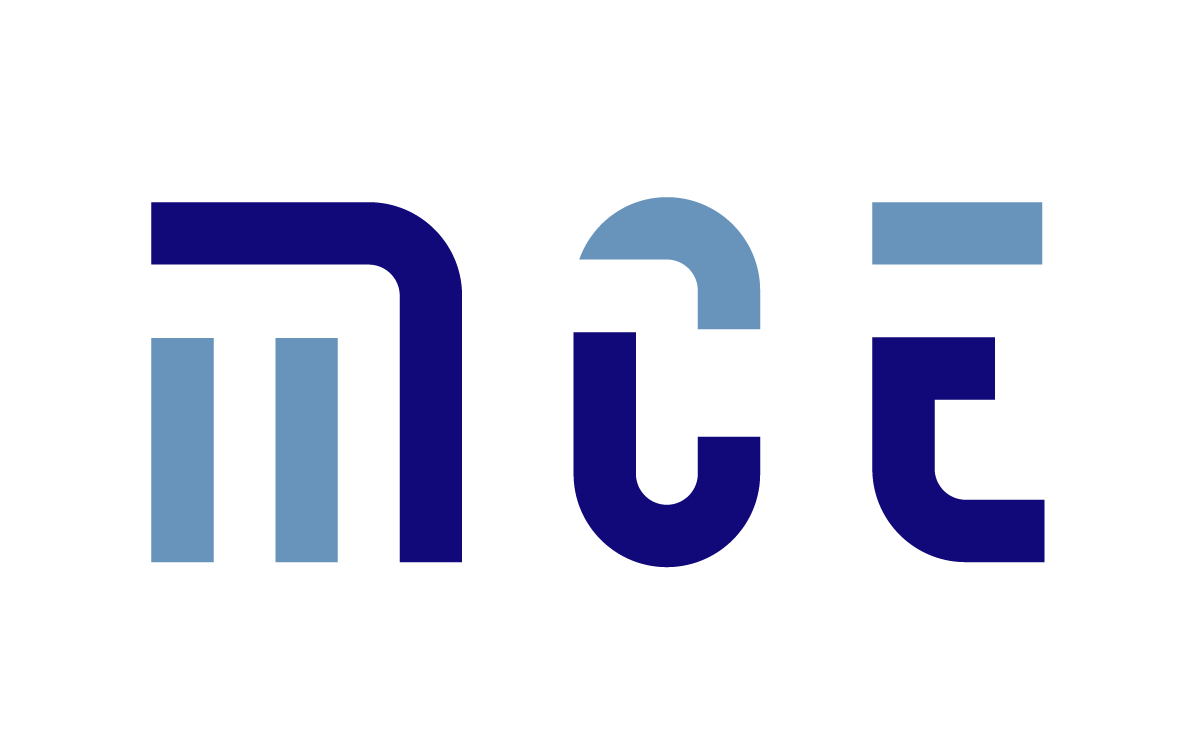
MCE project preparatory meeting- 18 January 2022
On January 18th, 2022, the MCE consortium meet in preparation of the project kick-off. During this meeting, all partners were introduced and met each other.
MCE stands for the Modularisation of Continuing Higher Education by Micro-credentials (MCE). This project in line with the proposal of the council recommendations from the EU Commission aims at providing the opportunity, to each partner and associated institutions, to be pioneers in the sector of micro-credentials, playing a key role in their understanding and development in national and EU levels.
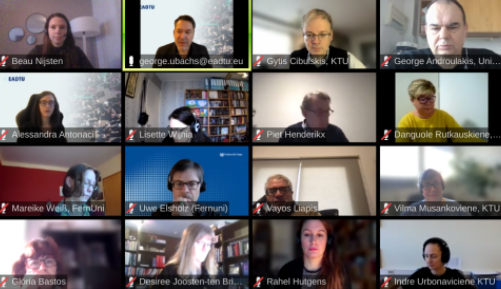
Proposal for Council Recommendation on micro-credentials
Council Recommendation on micro-credentials
The Commission has recently published its proposal for a Council Recommendation on micro-credentials, as announced in the Skills Agenda and in the European Education Area Communication of 2020. The Commission proposal seeks to make micro-credentials work across institutions, businesses, sectors, and borders. To that end, Member States should agree on:
- a common definition of micro-credentials;
- standard elements for their description; and
- key principles for their design and issuance.
The European approach to micro-credentials is a key flagship to achieving a European Education Area by 2025.
More can be read in the press release from 10 December 2021.
